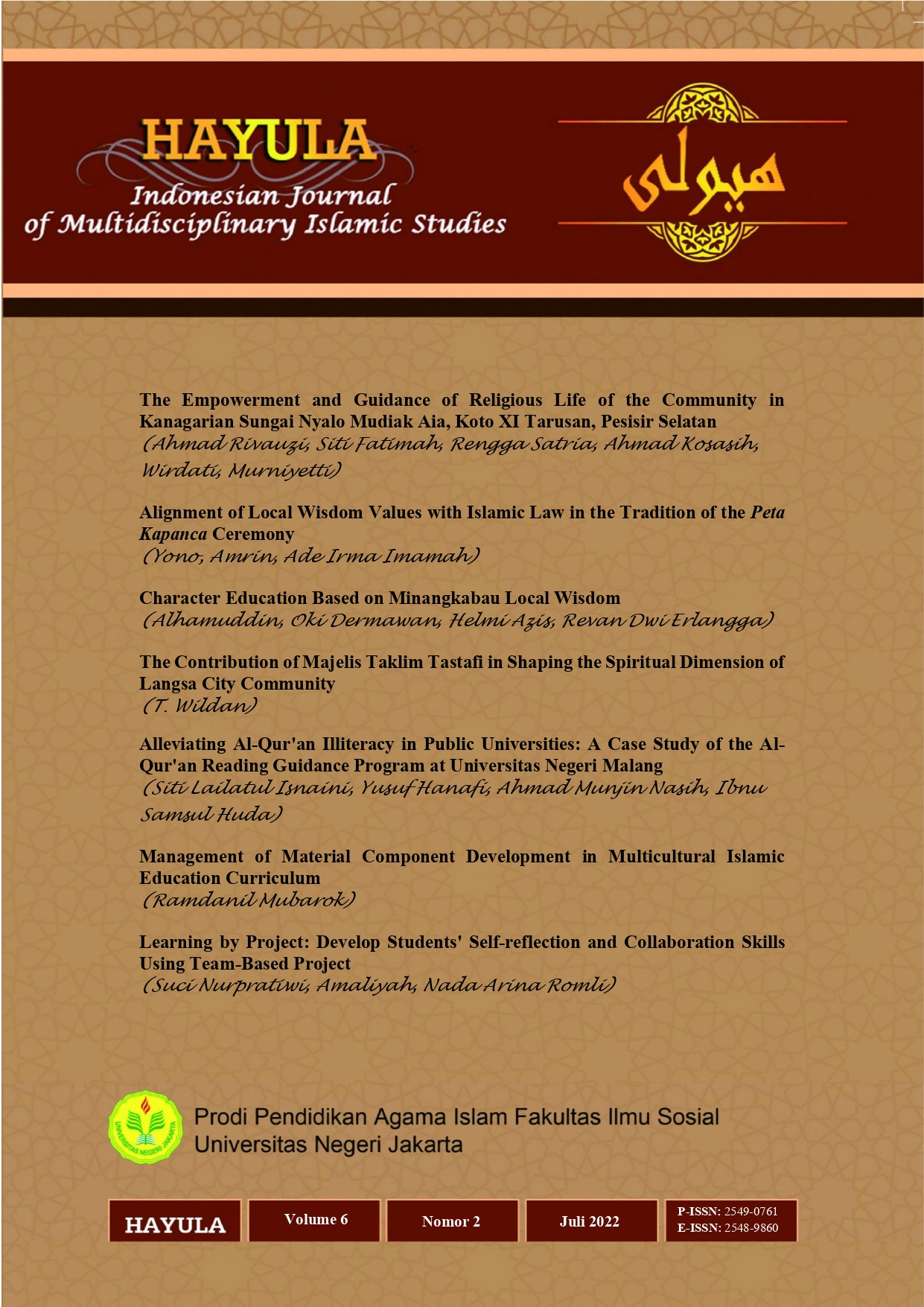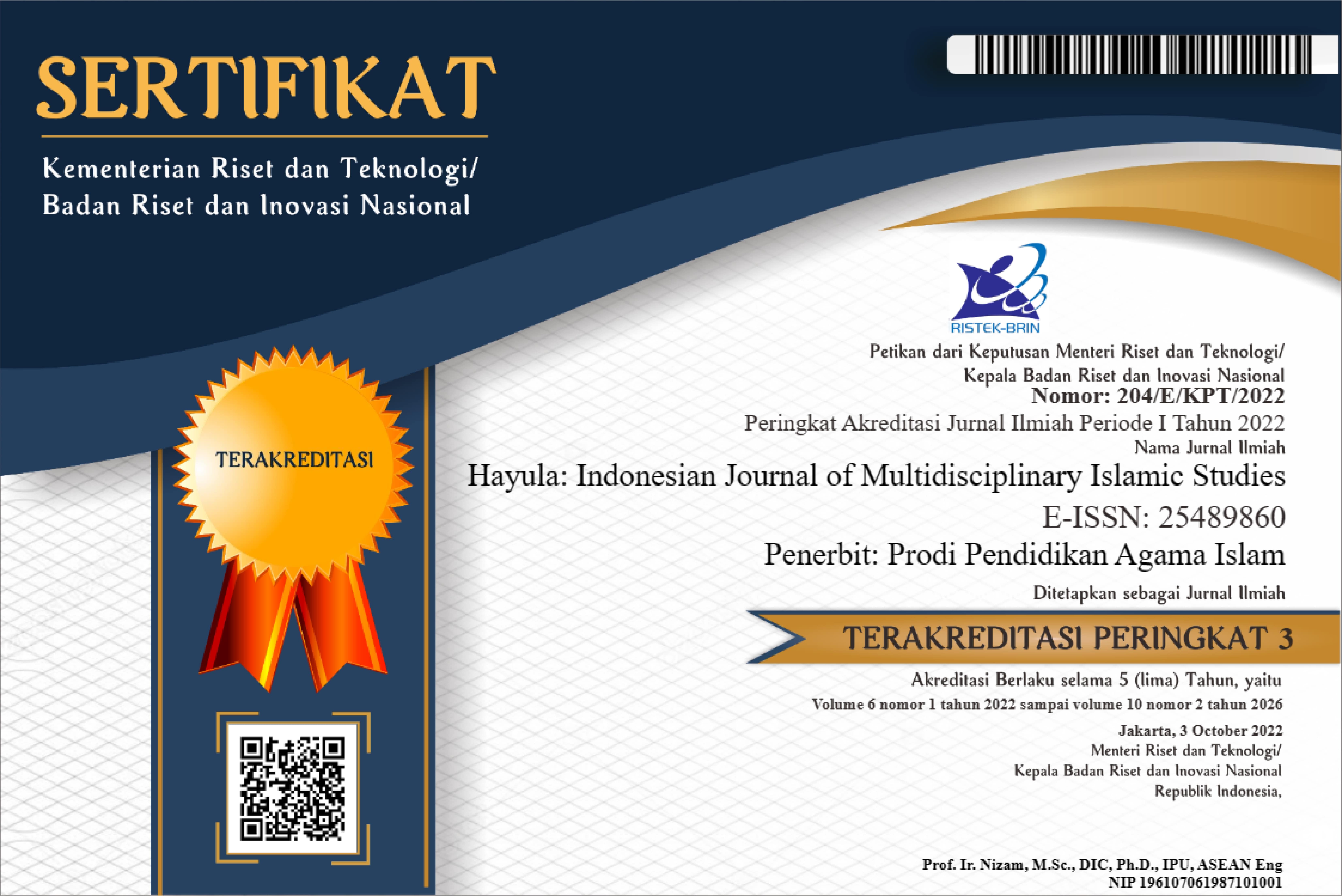Alignment of Local Wisdom Values with Islamic Law in the Tradition of the Peta Kapanca Ceremony
Research
DOI:
https://doi.org/10.21009/hayula.006.02.02Keywords:
Local culture, Islamic law, Peta kapanca, weddingAbstract
This research aimed to examine the alignment of local wisdom values with Islamic law in the tradition of the Peta kapanca ceremony in the Ambalawi sub-District. This study used a descriptive qualitative type with a phenomenological and sociological approach. The data collection method used observation, interviews, documentation, and a literature study. While the data analysis technique is descriptive and qualitative by reducing data, presenting data, and drawing conclusions. The results showed that the Peta kapanca tradition at the wedding ceremony of the Bima tribal community in the Ambalawi sub-district contained local wisdom values in the form of faith values, brotherhood values, mutual help values, and patient values. The values of local wisdom in the Peta kapanca tradition align with Islamic law, namely, having values that do not conflict with Islamic teachings. This made local wisdom in the Peta kapanca tradition and Islamic teachings valuable as instruments in developing Islamic da'wah teachings. In addition, socio-culturally as a bulwark against the modern era in the form of globalization and liberalization due to the influence of outside culture, which is starting to erode.
Keywords: Local culture, Islamic law, Peta kapanca, wedding
References
Badan Pusat Statistik Kabupaten Bima. 2020. “State of the Area and Population.”
Bazarkulova, Dana, and Janice Compton. 2021. “Marriage Traditions and Investment in
Education: The Case of Bride Kidnapping.” Journal of Comparative Economics 49 (1):
147–63. https://doi.org/10.1016/j.jce.2020.07.005.
Chudova, T. I. 2011. “Food Symbolism in the Context of Komi (Zyrians) Wedding Rituals.” Archaeology, Ethnology and Anthropology of Eurasia 39 (3): 128–34. https://doi.org/10.1016/j.aeae.2011.09.002.
Dalkılıç, Neslihan, and Adnan Nabikoğlu. 2020. “Documentation and Analysis of Structural Elements of Traditional Houses for Conservation of Cultural Heritage in Siverek (Şanlıurfa, Turkey).” Frontiers of Architectural Research 9 (2): 385–402. https://doi.org/10.1016/j.foar.2019.11.003.
Doucerain, Marina M. 2019. “Moving Forward in Acculturation Research by Integrating Insights from Cultural Psychology.”International Journal of Intercultural Relations 73 (July): 11–24. https://doi.org/10.1016/j.ijintrel.2019.07.010.
Fitria Shalza Rahmaniar, Suyitno, Supana, & Kundharu Saddhono. 2020. “Keselarasan Kearifan Lokal Dengan Nilai Keislaman Pada Tradisi Labuhan Gunung Kombang Di Kabupaten Malang Pendahuluan.” Jurnal SMaRT Studi Masyarakat, Religi Dan Tradisi 06 (01): 113–26.
Hadijah, Lailan. 2019. “Local Wisdom in Minangkabau Cultural Tradition of Randai.” KnE Social Sciences 2019: 399–411. https://doi.org/10.18502/kss.v3i19.4871.
Hasil Observasi pada Tanggal 14 Juli 2020. n.d.
Hasil Wawancara dengan Bapak Jalaluddin (Tokoh Agama) pada 19 Juni. 2020. “The Results of the Interview with Mr. Jalaluddin (Religious Leader) on June 19, 2020.”
Hasil Wawancara dengan Bapak Jamaluddin Yakub (Kepala Kantor Urusan Agama Kecamatan Ambalawi) pada 27 Juli. 2020. “Results of an Interview with Mr. Jamaluddin Yakub (Head of the Religious Affairs Office of Ambalawi Sub District) on 27 July 2020.”
Hasil Wawancara dengan Ibu Nursiah (Tokoh Adat) pada 17 Juni. 2020. “The Results of the Interview with Mrs. Nursiah (Traditional Figure) on June 17, 2020.”
Hasil Wawancara dengan Ibu Sadariah selaku Tokoh adat pada 15 Juni. 2020. “Hasil
Wawancara Dengan Ibu Sadariah Selaku Tokoh Adat Pada 15 Juni.”
Hasil Wawancara dengan Ibu Siti Hajar (Tokoh Adat) pada 17 Juni. 2020. “The Results of the Interview with Mrs. Siti Hajar (Traditional Figure) on June 17, 2020.”
Hasil Wawancara dengan Pak Alwi (Tokoh Agama) pada 16 Juni. 2020. “Hasil Wawancara Dengan Pak Alwi (Pemimpin Agama) Pada 16 Juni 2020.”
Inhorn, Marcia C., Daphna Birenbaum-Carmeli, Mira D. Vale, and Pasquale Patrizio. 2020. “Abrahamic Traditions and Egg Freezing: Religious Women’s Experiences in Local Moral Worlds.” Social Science and Medicine 253 (December 2019): 112976. https://doi.org/10.1016/j.socscimed.2020.112976.
Lee, Kyung Yur, and Hoon Lee. 2019. “Traditional Costume Experience at a Cultural Heritage Festival.” Tourism Management Perspectives 32 (July): 100555. https://doi.org/10.1016/j.tmp.2019.100555.
Lin, Ying, Sharon Arieli, and Daphna Oyserman. 2019. “Cultural Fluency Means All Is Okay, Cultural Disfluency Implies Otherwise.” Journal of Experimental Social Psychology 84 (July). https://doi.org/10.1016/j.jesp.2019.103822.
Manugeren, M, Robert Sibarani, Ikhwanuddin Nasution, and M Takari. 2017. “Local Wisdom in Hindu Tamil Ethnic Wedding Tradition in Medan.” International Journal of Research in Humanities & Soc. Sciences 5 (2012): 38–48.
McDonald, Mary M.A. 2020. “The Mid-Holocene Bifacial Projectile Points from Dakhleh Oasis, Egypt: Implications Concerning Origins of the Knapping Tradition, Changing Hunting Patterns, the Local Neolithic, and African Cultural Independence.” Journal of Anthropological Archaeology 59: 101199. https://doi.org/10.1016/j.jaa.2020.101199.
Muhammad Aminullah, Nasaruddin. 2017. “Wajah Islam Nusantara pada Tradisi Peta Kapanca dalam Perkawinan Adat Bima.” Tajdid: Jurnal Pemikiran Keislaman Dan Kemanusiaan I (1): 1–24.
Muhammad, Rosmaliza, Mohd Salehuddin Mohd Zahari, Alina Shuhaida Muhammad Ramly, and Roslina Ahmad. 2013. “The Roles and Symbolism of Foods in Malay Wedding Ceremony.” Procedia - Social and Behavioral Sciences 101: 268–76. https://doi.org/10.1016/j.sbspro.2013.07.200.
Observation results on July 12, 2020. n.d.
Pranata, Joni, Hadion Wijoyo, and Agung Suharyanto. 2021. “Local Wisdom Values in the Pujawali Tradition.” Budapest International Research and Critics Institute (BIRCI-Journal): Humanities and Social Sciences 4 (1): 590–96. https://doi.org/10.33258/birci.v4i1.1642.
Presenza, Angelo, Antonio Messeni Petruzzelli, and Lorn Sheehan. 2019. “Innovation Trough Tradition in Hospitality. The Italian Case of Albergo Diffuso.” Tourism Management 72 (November 2018): 192–201. https://doi.org/10.1016/j.tourman.2018.11.020.
Ramadhan, Rizki, and Bunyamin Maftuh. n.d. “Nilai-Nilai Sosial Budaya Masyarakat Rantau Etnis Minangkabau Sebagai Pedagang Di Pasar Al-Wathoniyah, Cakung, Jakarta Timur 1.”
Rindom Harahap. 2016. “Nilai-Nilai Budaya Lokal Dalam Budaya Islam Pada Masyarakat Lembak Di Kota Bengkulu.” Tsaqofah & Tarikh Vol. 01 (02): 191–208.
Samaddar, Arindam, Rosa Paula Cuevas, Marie Claire Custodio, Jhoanne Ynion, Anindita Ray (Chakravarti), Suva Kanta Mohanty, and Matty Demont. 2020. “Capturing Diversity and Cultural Drivers of Food Choice in Eastern India.” International Journal of Gastronomy and Food Science 22 (July): 100249. https://doi.org/10.1016/j.ijgfs.2020.100249.
Shobron; Amrin;, and Imron; Muthoifin Rosyadi. 2020. “Islamic Education Values in the Tradition of Peta Kapanca of Mbojo Community Tribe in West Nusa Tenggara Department of Islamic Law Universitas Muhammadiyah Surakarta Indonesia Mut122@ums.Ac.Id.” International Journal of Advanced Science and Technology 29 (5): 6802–12.
Sriyanto, Mr., Edi Kurniawan, and Halim Sukma Aji. 2019. “Local Wisdom of Kandri Village as a Form of Environmental Conservation,” no. January. https://doi.org/10.2991/icorsia-18.2019.44.
Yin, Chengzhi, and Xingyu Qian. 2020. “The Spatial Production of Simulacrascape in Urban China: Economic Function, Local Identity and Cultural Authenticity.” Cities 104 (September 2019): 102806. https://doi.org/10.1016/j.cities.2020.102806.
Zhu, Ming, and Yunfei Du. 2020. “Exploring Everyday Information Seeking of Ethnic Minorities with Small Populations in China.” Library and Information Science Research 42 (4): 101054. https://doi.org/10.1016/j.lisr.2020.10105
Downloads
Published
How to Cite
Issue
Section
License
Authors who publish with this Journal agree to the following terms:
- Author retain copyright and grant the journal right of first publication with the work simultaneously licensed under a creative commons attribution licensethat allow others to share the work within an acknowledgement of the work’s authorship and initial publication of this journal.
- Authors are able to enter into separate, additional contractual arrangementfor the non-exclusive distribution of the journal’s published version of the work (e.g. acknowledgement of its initial publication in this journal).
- Authors are permitted and encouraged to post their work online(e.g. in institutional repositories or on their websites) prior to and during the submission process, as it can lead to productive exchanges, as well as earlier and greater citation of published works.
Users/public use of this website will be licensed to CC BY







